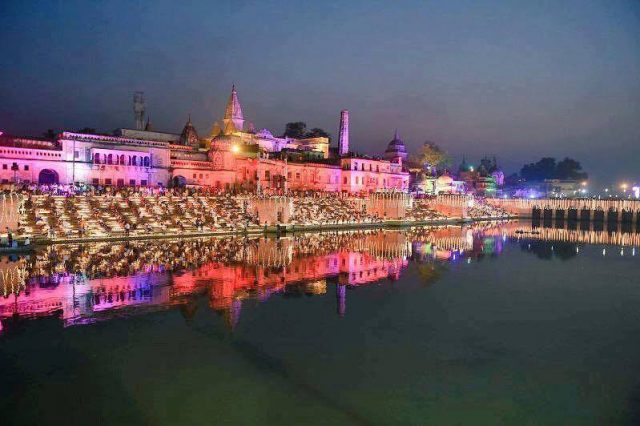
By Swapan Dasgupta
Sometimes, it takes a foreigner to bluntly state the obvious. President Donald Trump’s comments at a Diwali celebration at the White House were, obviously, principally aimed at the American Hindus who have contributed immeasurably to their country of adoption. However, it was equally directed at India, the country in which Diwali is more than a mere religious celebration, but one of the most important national festivals. This is patently obvious to all outsiders.
In London, at the Diwali celebrations organised by the Mayor of London in Trafalgar Square, the Indian High Commissioner took a pride of place, indicating quite clearly that Diwali and Indian nationhood are inseparable.
The festival of lights commemorating Lord Rama’s triumphant homecoming to Ayodhya after the Lanka campaign may have its origins in a combination of the Ramayana and religious tradition. However, the mere fact that it is regarded as a Hindu festival does not negate its enormous importance in a secular state.
India has quite self-consciously chosen to adhere to secular principles in the conduct of statecraft. There is no state religion, unlike, say, in the United Kingdom where the monarch is the head of the national Church of England. This does not mean that the Hindu ethos and civilisation doesn’t define Indian nationhood in a pre-eminent way. More to the point, the Hindu faiths-at least in their non-metaphysical dimensions-are intimately linked to the geography of India.
Despite attempts by modern gurus to universalise Hindu beliefs and traditions, it is impossible to mention Hindu without reference to India. The entire body of faith and not least the entire Puranic traditions are connected to the rivers, the mountains and, indeed, what has been called the “sacred geography” of India. This sacredness of geography is also true of other Indic faiths notably Buddhism, Jainism and Sikhism.
The grand Diwali celebrations this year in Ayodhya, with the entire riverfront of the holy city lit up with many thousands of diyas, has been needlessly accorded a narrowly partisan character, mainly by a section of the media that sees state involvement in Diwali as an affront to secular principles.
Uttar Pradesh Chief Minister Yogi Adityanath is undeniably a man who combines two roles-as the Mahant of the Gorakhnath Peeth and the head of an elected Government committed to the Constitution of India. The secular fundamentalists would doubtless argue that there is a potential conflict of interest, especially when the celebrations in Ayodhya were officially sponsored.
It would be facile to try and justify the grand spectacle in Ayodhya as an exercise in the promotion of tourism. Cleaning up the old city and improving its civic amenities will, no doubt, make Ayodhya more appealing for tourists. Equally, the installation of a gigantic statue of Lord Ram and, in due course, the dedication of a grand Ram temple at the place of his birth, will put Ayodhya on the pilgrimage map of India. A local tourist economy is bound to emerge side by side with these improvements and construction. But that will be an incidental offshoot. Far more significant will be the official recognition of Ayodhya’s importance in defining the personality of India. It is impossible to detach Varanasi from the larger ‘idea of India’-a reason why this place needs a huge upgradation of its urban infrastructure.
Likewise, Ayodhya needs to be rescued from both neglect and the associated elite condescension of its inheritance. Yogi Adityanath has done well to put Ayodhya at the centre of his first observance of Diwali as Chief Minister. Hopefully, he will consider a similar initiative for Mathura and the birthplace of Lord Krishna in time for Janmasthami.
The personality and character of India is a unique cocktail. There is the modern dimension where the Constitution, public institutions, technology and even Bollywood and cricket play a great role. At the same time, there is a significant input of inheritance. What we recognise of India is also a blend of recorded history, mythology and folk traditions — a blend that may not always correspond with the yardsticks of rationalism and ‘scientific’ history. The point is to not reduce India to global, post-Enlightenment templates but to recognise that there is a distinctiveness that must be celebrated and upheld. It also does not mean that we should reduce India to one grand narrative and shove other currents aside.
The diversity of India allows space for streams, tributaries and distributaries, not to mentions hills and mountains that have their own stories. As scholars have noted, India combines the Great and Little traditions. Even Diwali has different characters, such as in Eastern India where Kali Puja is the preferred festival that blends into the outward forms of the Diwali celebrated North of the Vindhyas. The point is to not deny the religious underpinnings of all the national festivals of the country but acknowledge and celebrate these. India is plural because the Hindu faiths are linked by both diversity and commonality. And India is secular precisely because there is no pretension that some faiths are more equal than others. Outsiders have recognised the essence of India. The point is to get a section of the Indian intelligentsia to also acknowledge that the nation is also built on shared sentiments, many of which are quite explicitly religious. To be a proud Hindu adds richness to being a proud Indian.
Courtesy: Daily Pioneer














